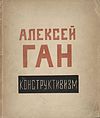
Aleksei Mikhailovich Gan (Russian: Алексей Михайлович Ган; born Imberkh; 1887 or 1893 – 8 September, 1942) was a Russian anarchist and later Marxist avant-garde artist, art theorist and graphic designer. Gan was a key figure in the development of Constructivism after the Russian Revolution.
Life

Gan's involvement with creative activity began in 1917 when he became involved with the Moscow Union of Food Workers with whom he set up an amateur theatrical group. The group encompassed various political groupings and following the Bolshevik seizure of power, some joined the Red Army, others the Black Guards or affiliated to the Left Socialist-Revolutionaries. Gan reorganised the group as the Proletarian Theatre, which affiliated to the Moscow Federation of Anarchist Groups.
Gan was the first to write on art in the anarchist newspaper Anarkhiia (Anarchy) when it introduced an art section in early 1918. In March 1921, Gan was one of the seven artists, including Alexander Rodchenko and his wife Varvara Stepanova, who announced themselves as the First Working Group of Constructivists. The group rejected fine art in favour of graphic design, photography, posters, and political propaganda. Gan collaborated with Aleksandr Rodchenko and Varvara Stepanova on a Constructivist manifesto in 1922, and published his own pamphlet Konstruktivism in the same year. He also founded the first Soviet film journal, Kino-Fot (or Kinofot), in 1922.
In 1928 he was one of the founders of the October Group.
He married Esfir Shub, a prominent female soviet documentary filmmaker.
Gan was arrested for "counter-revolutionary" activities in October 1941, found guilty in August 1942, and executed on 8 September 1942.
Selected works
Written
- Konstruktivizm (Constructivism). Tver: Tver'skoe izdatel' stvo, 1923.
Films
- The Island of the Young Pioneers, 1924. (Documentary)
- The Seventh October,
- Trades Unions
- Greetings Teamworkers
- In the Battle for Time and Space (unknown whether completed)
See also
References
- ^ Kristin Romberg, Aleksei Gan's Constructivism, 1917-1928. New York: Columbia University, 2010, Ph.D. Dissertation.
- ^ "Gan, Aleksei". VIAF. Retrieved 13 June 2016.
- Jeremy Howard, Aleksei Gan, Grove Art Online.
- Romberg, Kristin (2019). Gan's constructivism: aesthetic theory for an embedded modernism. Oakland, California: University of California Press. ISBN 9780520298538.
- Nina Gourianova, The Aesthetics of Anarchy : Art and Ideology in the Early Russian Avant-Garde
- Maria Gough (2005). The Artist as Producer: Russian Constructivism in Revolution. University of California Press. p. 2. ISBN 978-0-520-22618-0.
- "Rodchenko, Alexander." by Yvonne Jones in The Oxford Companion to Western Art. Oxford Art Online. Oxford University Press. Accessed 10 May 2013.
- 'Who We Are: Manifesto of the Constructivist Group', in Alexander N. Lavrentiev, ed., Alexandr Rodchenko: Experiments of the Future, 2005, pp.143-45
- Willem G. Weststeijn (2013). "Aleksei Gan's Constructivism and its aftermath". In Ralf Grüttemeier; Klaus Beekman (eds.). Neue Sachlichkeit and Avant-Garde. Rodopi. pp. 373–. ISBN 978-94-012-0909-0.
- Petrič, Vlada. (1993) Constructivism in Film: The Man With the Movie Camera : A Cinematic Analysis. Cambridge: Cambridge University Press, p. 13. ISBN 0521443873
- "CONSTRUCTIVISM / Aleksei Gan". Tenov Books. EDITORIAL TENOV. Retrieved 4 October 2015.
- Murray Brown, Jeremy. "Esfir Il'inishna Shub". Jewish Women: A Comprehensive Historical Encyclopedia. Jewish Women's Archive. Retrieved 21 October 2013.
Further reading
- Catherine Cooke (2003). "Sources of a radical mission in the early Soviet profession: Alexei Gan and the Moscow anarchists". In Neil Leach (ed.). Architecture and Revolution: Contemporary Perspectives on Central and Eastern Europe. Routledge. pp. 13–. ISBN 978-1-134-77164-6.
- Kristin Romberg (2018). Gan's Constructivism: Aesthetic Theory for an Embedded Modernism. University of California Press. ISBN 9780520298538.
External links
| Constructivist art movement | ||
|---|---|---|
| Artists, architects, and theorists |  | |
| Groups and organisations | ||
| Magazines and journals | ||
| Exhibitions | ||
| Related concepts | ||